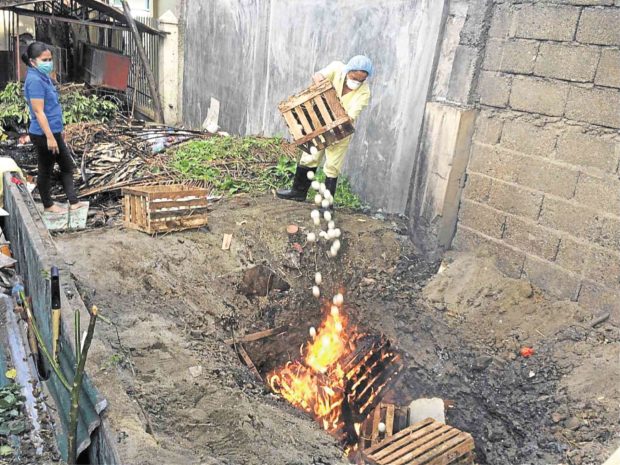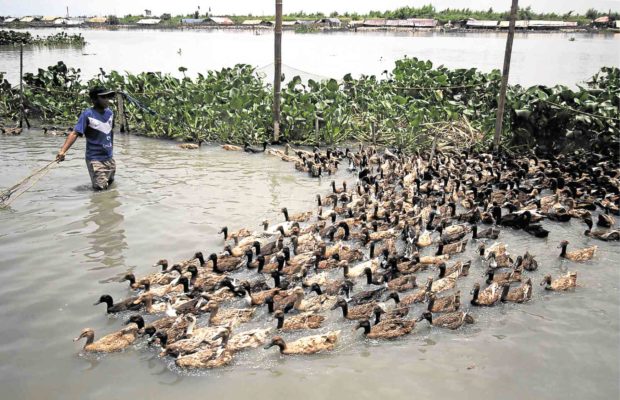Bird flu virus slips into 2 Nueva Ecija towns

Duck eggs shipped from Candaba, Pampanga, are thrown into the fire to be destroyed at the quarantine compound in Zamboanga City to prevent the spread of the avian flu virus. —PHOTO COURTESY OF BUREAU OF ANIMAL INDUSTRY QUARANTINE SERVICES
Seven days after the government declared an avian flu outbreak in Pampanga, the authorities announced on Friday a similar outbreak in at least two towns in neighboring Nueva Ecija.
Agriculture Secretary Manny Piñol said tests confirmed that the avian flu virus strain found in San Luis, Pampanga, has also been found in the towns of Jaen and San Isidro in Nueva Ecija, about 32 kilometers away.
Despite the confirmation, the Department of Health (DOH) advised the public to remain calm but vigilant since there is no threat to public health and the problem remains an animal health concern.
The Department of Environment and Natural Resources ordered a close watch on 45 bird sanctuaries ahead of the bird migration season that starts next month.
Same H5 strain
Article continues after this advertisementPiñol confirmed that the H5 avian flu virus strain that caused the outbreak in Pampanga also struck a layer farm in the town of San Luis (32 km away) and a quail farm in Jaen, both in Nueva Ecija.
Article continues after this advertisementThe farm in Jaen was wiped out while the layer farm in San Isidro lost about 200,000 heads, Piñol said.
A total of 28,000 layer chickens, 22,000 ducks, 57,000 native chickens and 200,000 quails were affected by the outbreak, he said.
Piñol said the protocol that was implemented in Pampanga will also be followed in Nueva Ecija.
“A task force is set to implement the culling similar to the one done in San Luis,” said Felicito Espiritu Jr. of the Department of Agriculture’s Central Luzon regional office.
The task force will start culling chickens, ducks and other birds within a 1-km radius of the areas where the virus was found and quarantine the transport and distribution of all types of birds and their eggs within a 7-km radius.
DOH teams will also be deployed although no case of bird-to-human transmission has been reported and the two flu cases of two Pampanga farmers were determined not to be human in origin.
No health crisis
“Secretary Paulyn Jean Ubial has deployed a team to Nueva Ecija following the confirmation of the outbreaks in San Isidro and Jaen,” said DOH spokesperson Dr. Enrique Tayag.
“We are in a state of heightened vigilance given this bird flu affecting feathered animals, especially chickens. We are continuously monitoring this,” he said.
“It remains an animal health problem,” Tayag said, noting personnel who will be culling infected fowl will be given the antiviral oseltamivir.
“Even if you live [in the affected areas], as long as you did not have direct contact with infected chickens, you are not included in the DOH’s monitoring,” he said.
“Let us all be vigilant by not withholding from the government any unusual deaths or illnesses in any poultry in the country, so that the DA and the DOH can take action immediately,” he said.
The Philippine Coast Guard (PCG) has ordered a quarantine on poultry from Luzon island.
In a memorandum, the PCG said the transport of fresh uncooked poultry meat must come with a shipping permit and health certificate issued by a government veterinarian.
The certificate should ensure that the products came from farms with no incidence of bird flu at least 21 days before shipment.
More than 21 tons of frozen dressed chicken from Luzon have already been held for testing in Cagayan de Oro, according to the National Meat Inspection Service (NMIS).
Dr. Angelita Barcelona, NMIS Northern Mindanao regional director, said one meat inspector has been assigned to every NMIS-accredited poultry processing facility in Northern Mindanao to ensure slaughtered chickens do not have avian flu.
Carlene Collado, the DA regional director, said the region produces each year about 2.1 million chickens and ranks third among the chicken growers and the eighth top grower of ducks.
As for poultry farms already affected by the outbreak, Piñol said he has asked President Duterte to set aside a P100-million fund to help poultry producers.
Only one week after the quarantine, poultry farmers are already hurting.
Industry damage
Manuel Ortiz-Luis, who owns the chicken layer farm in San Isidro, said he stands to lose 70,000 chickens although his farm only recorded 20 deaths due to avian flu.
He said an egg-laying chicken costs P300 and the DA’s compensation of P80 per bird will not cover losses.
The industry group Samahang Industriya sa Agrikultura (Sinag) urged the agriculture department to clarify the situation of poultries within the 7-km controlled zone.
“The secretary said they should be contained. But what about those who do not have suspected virus? Why curtail the movement of their products? What will happen to the livelihood of these people?” asked Sinag chair Rosendo So.
Since news of the avian flu outbreak, So said farm-gate prices of chickens have declined by 50 percent to P35-40 from P80-90, which is way below the farmers’ cost of production.
However, the prices of chicken meat in Metro Manila remain high. So urged the DA and the Department of Trade and Industry to lower chicken prices to P80-90 so consumers can at least benefit from the lose-lose scenario.
“This should be reflected in the retail prices because right now, there is an obvious disconnect from farm-gate prices to retail,” So said.
The DENR started watching migratory bird sanctuaries ahead of the arrival of migratory birds from China.
DENR regional official Oliver Viado said wild migratory birds worldwide naturally carry harmless avian flu viruses that can turn harmful when they go to poultry farm for food.
This will have more importance beginning next month when migratory birds start arriving in bird sanctuaries in Luzon.
These areas are wetlands and ricefields, of which nine are in Batangas, three in Cavite, 10 in Laguna and 23 in Quezon. The most common migrant bird is the Chinese egret.

Hundreds of ducks swim in Laguna de Bay in Taguig City as duck raisers worry about the avian flu outbreak which has affected three towns in Pampanga and Nueva Ecija. —RICHARD A. REYES
Don’t touch dead birds
Viado said the public should not even touch dead wild birds. “Avoid handling any sick or dead wild birds and keep poultry and domestic animals separate from wild birds and other wildlife,” he said.
He said migratory birds “are not the culprit” of the flu but also victims.
Calabarzon, specifically San Jose town in Batangas, is home to several poultry farms producing more than 7 million chicken eggs daily. —WITH REPORTS FROM ANSELMO ROQUE, ARMAND GALANG, TONETTE OREJAS, MARICAR CINCO, DELFIN T. MALLARI JR., JIGGER JERUSALEM AND JULIE ALIPALA